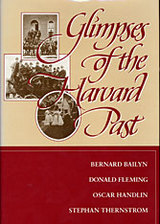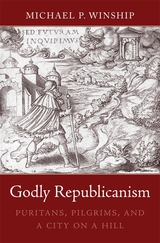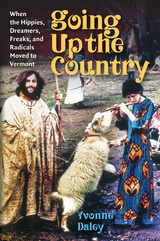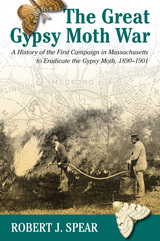7 start with G start with G

This happy combination of literary essay and exceptionally well-written history, providing insights into a past still important in the twentieth century, will quickly take an honored place on the shelves of Harvardiana.
Bernard Bailyn writes on the origins of Harvard and the foundations of Harvard’s persistent character, structure, and style of governance, and contributes another chapter on the unhappy ending to the administration of the beloved President Kirkland, who presided over but could not control a period of profound change. Oscar Handlin describes the shifting relationships and power struggles among faculty, administration, and students over the years (“Making Men of the Boys”) and Harvard’s evolution from an ingrown community of teachers and students into a large, complex institution with worldwide prestige. Donald Fleming has chapters on the presidency of Charles William Eliot (“the greatest man in the history of Harvard”) and the colorful personalities of Harvard (not only “Copey” and Santayana and Charles Eliot Norton, but also “Old Sophy,” who kept a pet chicken in his room in Holworthy). Stephan Thernstrom examines the growing diversity of the student body as to finances, geography, religion, and racial background from the eighteenth century to the 1980s.
The subjects are of continuing interest not only to members of the Harvard community, who will treasure this memento of Harvard’s 350th anniversary, but also to historians of higher education and ordinary readers, who will enjoy the new information, original personalities, and thoughtful perspectives the book offers.

This book will appeal to a broad audience of historians and students of American visual art, as well as scholars and students of fine and decorative arts.
Hardcover is un-jacketed.

Puritans did not find a life free from tyranny in the New World—they created it there. Massachusetts emerged a republic as they hammered out a vision of popular participation and limited government in church and state, spurred by Plymouth Pilgrims. Godly Republicanism underscores how pathbreaking yet rooted in puritanism’s history the project was.
Michael Winship takes us first to England, where he uncovers the roots of the puritans’ republican ideals in the aspirations and struggles of Elizabethan Presbyterians. Faced with the twin tyrannies of Catholicism and the crown, Presbyterians turned to the ancient New Testament churches for guidance. What they discovered there—whether it existed or not—was a republican structure that suggested better models for governing than monarchy.
The puritans took their ideals to Massachusetts, but they did not forge their godly republic alone. In this book, for the first time, the separatists’ contentious, creative interaction with the puritans is given its due. Winship looks at the emergence of separatism and puritanism from shared origins in Elizabethan England, considers their split, and narrates the story of their reunion in Massachusetts. Out of the encounter between the separatist Plymouth Pilgrims and the puritans of Massachusetts Bay arose Massachusetts Congregationalism.



Henry David Thoreau is best known as a writer, naturalist, and social critic, but he was also a schoolteacher, surveyor, and pencil-maker. In The Gospel According to This Moment, Unitarian minister Barry M. Andrews reveals how an idiosyncratic and unconventional religious faith was central to Thoreau’s many-faceted life—a dimension that has been largely unexamined.
Through close readings of his writings and a focus on his Unitarian upbringing, Harvard education, mentoring by Ralph Waldo Emerson, and immersion in ancient Eastern and Western philosophies, Andrews explores the nature of Thoreau’s spiritual message, what he called the “Gospel according to this moment,” which enables a flourishing and deliberate life. Today, Thoreau is widely recognized as an advocate for simple living, environmental preservation, and civil disobedience. As Andrews uncovers, Thoreau is also a spiritual guide who can teach us an alternative way of being religious in the world.

During the Civil War, when the supply of cotton from southern fields was disrupted, the owners of northern textile mills looked elsewhere for raw fiber. One source was silk. Among those experimenting with silkworm production was a Frenchman named Etienne Leopold Trouvelot, who had settled outside of Boston. It was Trouvelot who imported the gypsy moths and inadvertently allowed them to escape. Soon the invasion was on and a counteroffensive was required.
Spear reveals the turbulent undercurrents in the eradication campaign when the enthusiasm of the entomologists in charge turned into desperation upon the discovery that their alien adversary was much tougher than they thought. Fighting a war they could not win and dared not lose, the leaders of the campaign resorted to political maneuvering, cheap tricks, and outright misrepresentation to maintain a façade of success, urging the Commonwealth to continue funding the war long after any chance of victory had faded.
More than just reviewing the important events of this historic episode, Spear tells the story in an engaging way, often through the first-hand accounts of those who were directly involved. Much of what Spear has written is new, the recounting is lively, and the information he presents shows that almost all of the previous beliefs about the campaign to eradicate the gypsy moths are myths. In the process, he also traces the rise of modern economic entomology and the birth of the pesticide industry.
READERS
Browse our collection.
PUBLISHERS
See BiblioVault's publisher services.
STUDENT SERVICES
Files for college accessibility offices.
UChicago Accessibility Resources
home | accessibility | search | about | contact us
BiblioVault ® 2001 - 2024
The University of Chicago Press









